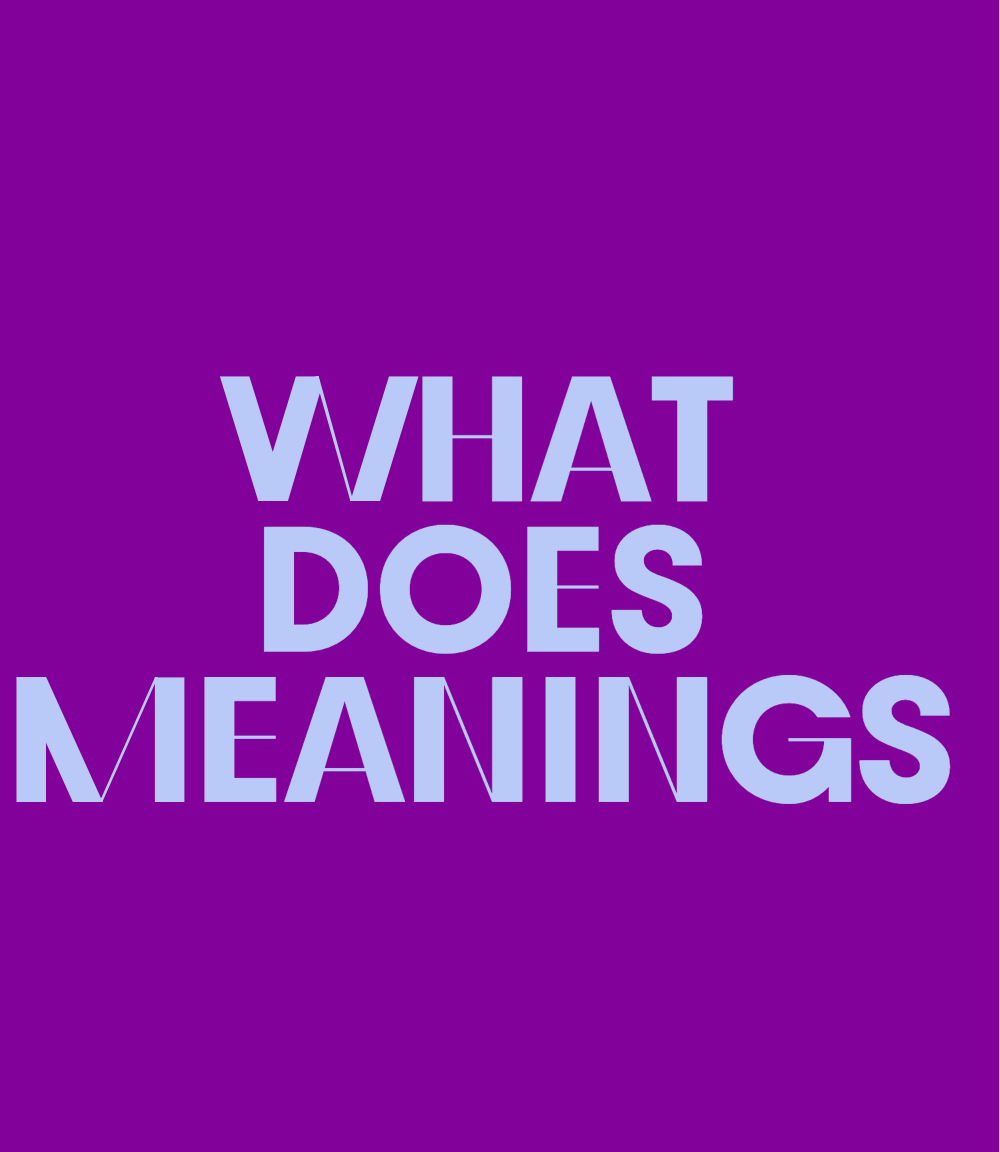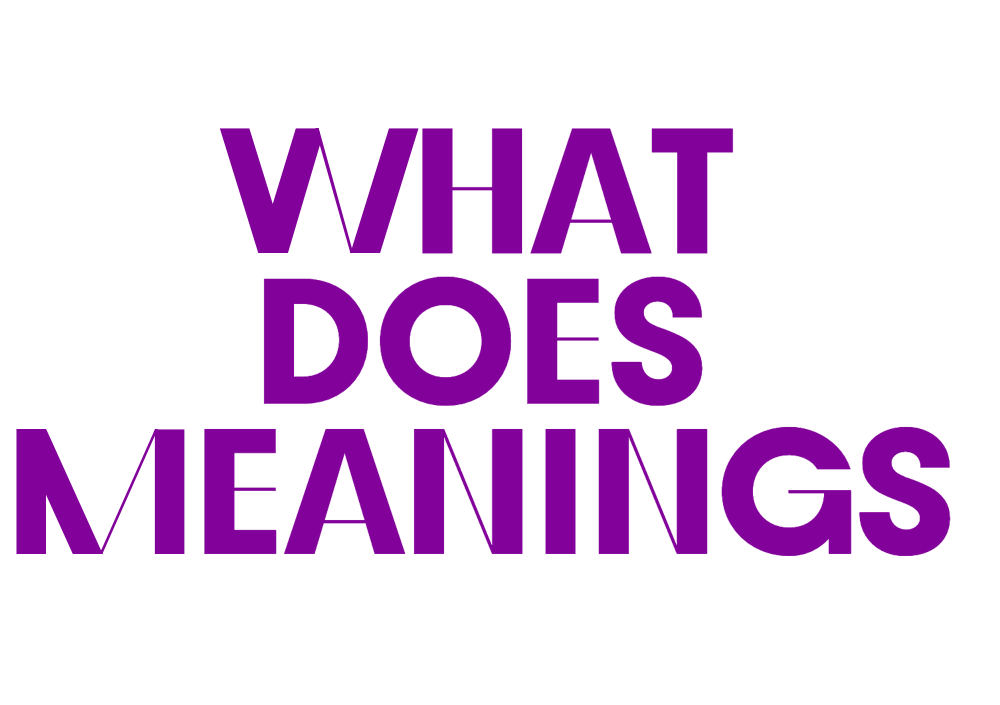Numerology and Astrology
What Makes Numerology Haram in Islam?
Suggesting numerology's prohibition in Islam, rooted in theological conflicts, unveils why this practice is deemed Haram.
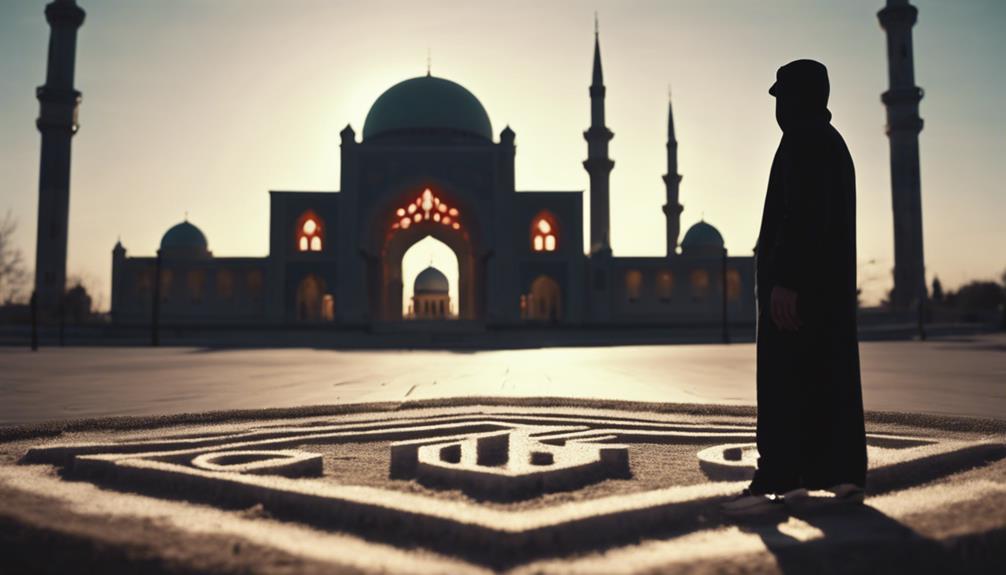
Exploring numerology in Islam is considered Haram due to reasons rooted in Islamic teachings. Seeking knowledge of the unseen future through numerology is forbidden as it conflicts with trusting in Allah's decree and the principle of Tawhid. Numerology's association with divination practices goes against Islamic beliefs by attributing mystical powers to numbers. It challenges faith in Allah's sovereignty, potentially leading to shirk. Decision-making based on numerology blurs the lines between fate and free will, contrasting with Islamic reliance on Allah's wisdom. Understanding these conflicts sheds light on why numerology is incompatible with Islamic principles and beliefs.
Key Takeaways
- Numerology delves into the unseen, forbidden in Islam.
- It contradicts the Tawhid principle, risking shirk.
- Associated with divination practices, prohibited in Islamic teachings.
- Challenges faith in Allah's decree and sovereignty.
- Undermines reliance on Allah, blurring fate and free will.
Prohibition of Seeking Knowledge of the Unseen
Exploring knowledge of the unseen is strictly forbidden in Islam as it steers us away from relying solely on the wisdom of Allah. In Islam, seeking knowledge of the future, such as through numerology, is considered impermissible. This prohibition extends to practices like using numbers to predict outcomes or seeking the cures for ailments through numerical methods. Islam teaches us to place our trust in Allah's decree and not to investigate into areas that are beyond human understanding.
Numerology, as a form of numbers, is incompatible with Islamic beliefs as it can lead to shirk by attributing unseen powers to numerical symbols, diverting us from the oneness of Allah. By prohibiting access to the unseen, Islam emphasizes the importance of faith, submission to Allah, and reliance on His guidance. It's through this reliance on Allah that Muslims find strength and solace, understanding that true knowledge and wisdom reside with the Creator.
Incompatibility With Islamic Beliefs
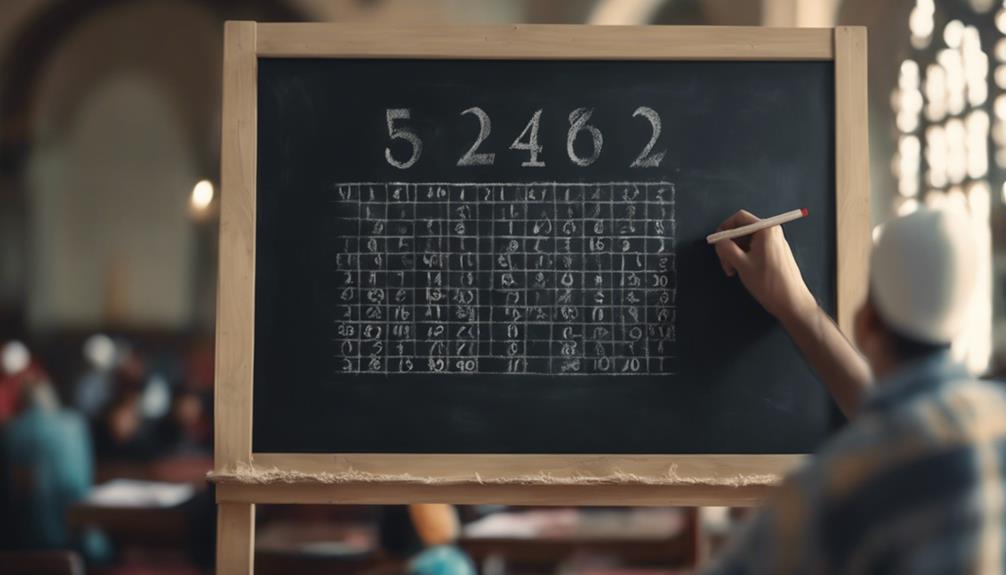
Numerology in Islam is fundamentally incompatible with Islamic beliefs due to its association with seeking knowledge of the unseen world through numbers. This contradicts the core principle of Tawhid, the oneness of Allah, in Islam. Believing in the supernatural power of numbers goes against the teachings of relying solely on Allah for guidance and solutions, leading to potential shirk, or associating partners with Allah, which weakens one's faith. Islam strictly prohibits seeking help or predictions through numerology as it deviates from the essence of the religion.
| Numerology is Haram in Islam | Seeking Knowledge of the Unseen World |
|---|---|
| Contradicts Tawhid principle | Goes against relying solely on Allah |
| Leads to potential shirk | Weakens faith in Allah |
| Prohibited in Islam | Deviates from core beliefs |
Association With Divination Practices

Numerology is viewed as forbidden in Islam because it's linked to divination practices, which involve attempting to gain hidden knowledge or foresee the future using numbers. This association is considered misleading as it encourages individuals to seek spiritual guidance through methods that contradict Islamic teachings.
Divination Is Forbidden
Engaging in practices associated with divination, such as numerology, is strictly prohibited in Islam due to its connection with seeking information through occult means. As Muslims, we believe in placing our trust in Allah alone for guidance and not in fortune-telling or numerology. Divination contradicts the fundamental Islamic principle of Tawheed (oneness of Allah) by suggesting that knowledge of the unseen can be obtained through methods other than seeking help from Allah. This table illustrates the reasons why divination, including numerology, is considered haram in Islam:
| Reasons Divination Is Forbidden |
|---|
| Contradicts reliance on Allah for guidance |
| Leads to shirk (associating partners with Allah) |
| Goes against the belief in the unseen known only to Allah |
| Promotes seeking knowledge through prohibited means |
Spiritual Guidance Misleads
Seeking spiritual guidance through practices associated with divination can lead to a dangerous path of straying from Islamic teachings. Numerology, a practice that involves interpreting numbers to gain insights into the future, contradicts the beliefs of Islam by attributing unseen powers to numbers and seeking knowledge of the unseen.
This association with divination practices can mislead individuals by promoting the idea that magic is real and that solutions to life's challenges can be found in numerical patterns. It's essential to understand that while seeking the cures for our problems, engaging in numerology may risk leading us away from the true teachings of Islam and into forbidden territories.
Seeking Hidden Knowledge
Delving into hidden knowledge through practices associated with divination can lead individuals astray from the teachings of Islam. Numerology, with its focus on numbers to reveal concealed information or predict outcomes, contradicts Islamic beliefs. This practice of seeking hidden knowledge is deemed exclusive to Allah alone in Islam. By engaging in numerology to gain insights or make decisions, individuals risk straying from the reliance on Allah's wisdom and guidance. Below is a table illustrating the contrast between seeking hidden knowledge through numerology and relying on Allah's wisdom:
| Hidden Knowledge Through Numerology | Relying on Allah's Wisdom |
|---|---|
| Seeks insights through numbers | Trusts in Allah's guidance |
| Attempts to predict future outcomes | Believes in divine plan |
| Contradicts Islamic teachings | Aligns with Islamic faith |
| Risks shirk and weakening faith | Strengthens faith in Allah |
Contradiction to Faith in Allah

Numerology in Islam challenges our fundamental belief in Allah's sovereignty over all things, including the unseen. By turning to numerology for guidance, we risk weakening our reliance on Allah's wisdom and divine plan.
The practice of numerology can lead us astray from the oneness of Allah, contradicting our faith in His ultimate knowledge and decree.
Allah's Oneness Principle
Contrary to the core tenet of Tawhid in Islam, attributing mystical attributes to numbers contradicts the fundamental belief in Allah's singular authority and knowledge. This monotheistic faith emphasizes the exclusive power and wisdom of Allah, making any form of numerology incompatible with Islamic beliefs.
By associating supernatural significance with numbers, individuals risk straying into shirk, associating partners with Allah, which is strictly prohibited in Islam. Engaging in numerology practices undermines the belief in divine oneness and the concept of Allah's absolute sovereignty over all creation.
It's essential to uphold the principle of Tawhid and avoid practices that dilute the monotheistic faith in Allah's control over every aspect of our lives.
Belief in Divine Decree
Believers in Islam maintain a steadfast trust in Allah's divine decree, recognizing His ultimate authority over all aspects of existence. It's impermissible to use numerology in Islam as it contradicts the core belief in Allah's divine will.
Understanding what I'm trying to convey, it's essential to avoid practices that attribute power to numbers and undermine the concept of tawakkul, reliance on Allah. Seeking guidance through numerology when deciding goes against the fundamental principle of submitting to Allah's decree.
Islam emphasizes trusting in Allah's plan without resorting to superstitions or seeking solutions through numerological practices. Therefore, it's vital to rely solely on Allah for guidance and outcomes, rather than turning to numerology for answers.
Trust in Allah's Wisdom
Emphasizing submission to Allah's will, trust in His wisdom forms a foundational pillar of Islamic faith. Trust in Allah's wisdom is essential for believers, guiding them through life's challenges with confidence in His divine plan.
This reliance on Allah allows for a deeper connection to one's faith and a sense of peace in times of uncertainty. Seeking guidance from Allah through prayer and reflection strengthens this trust, providing clarity and direction in decision-making.
Relying on numerology undermines this trust, diverting attention from the true source of wisdom and knowledge. By prioritizing trust in Allah's wisdom over superstitions, individuals can cultivate a stronger faith and a more profound sense of purpose in their lives.
Potential for Shirk (Polytheism)

Engaging in numerology within Islam poses a risk of shirk by attributing unseen powers to numbers. This contradicts the core belief of monotheism in Islam, which emphasizes the oneness of Allah and warns against associating partners with Him.
Seeking guidance or predictions through numerology can lead individuals astray from the true teachings of Islam, as it suggests that numbers hold a divine power that can influence one's fate. By placing faith in the mystical significance of numbers, there's a danger of deviating from the belief in Allah's ultimate wisdom and control over all aspects of life.
Such practices can potentially lead to shirk by seeking knowledge or assistance from sources other than Allah, undermining the fundamental principle of tawhid (oneness of Allah) in Islam. It's essential for Muslims to be cautious of engaging in numerology, as it may inadvertently lead to polytheistic beliefs that conflict with the monotheistic foundation of Islam.
Impact on Decision-Making and Fate

Considering the implications of numerology in Islam on decision-making and fate, one must acknowledge the risks associated with attributing mystical powers to numbers. Belief in numerology can lead individuals astray from the fundamental Islamic principle of relying solely on Allah for guidance and outcomes. Here are some key points to take into account:
- Allah's Decree: Decision-making based on numerology undermines the belief that Allah's decree is absolute and the ultimate determinant of outcomes.
- Reliance on Allah: Seeking guidance from numbers contradicts the concept of tawakkul in Islam, which emphasizes placing trust in Allah alone.
- Fate and Free Will: Numerology's influence on fate can blur the distinction between predestined fate and individual free will, potentially leading to a fatalistic outlook on life.
In Islam, decisions should be made through prayer, reflection, consultation, and seeking legitimate knowledge, rather than relying on numerology or superstitions. Trust in Allah's wisdom and guidance is paramount in addressing life's challenges and uncertainties.
Frequently Asked Questions
Does Islam Believe in Numerology?
Islam doesn't endorse numerology due to its categorization as a form of fortune-telling, which goes against Islamic teachings. The faith emphasizes reliance on Allah and following the Prophet's guidance rather than seeking answers through numerology.
Consulting numerology experts can potentially harm one's faith in Islam. It's crucial to prioritize Islamic beliefs and practices over engaging in numerology to maintain a strong connection with Allah.
Why Is Astrology Haram in Islam?
Astrology is deemed haram in Islam because it involves attributing unseen knowledge to celestial bodies, contradicting monotheism. Seeking future insights from astrologers goes against Islamic teachings, which prohibit such practices. Belief in astrology undermines trust in Allah's ultimate control over destiny.
Consulting astrologers is considered disobedient in Islam. This prohibition stems from the fear of shirk, or polytheism, which is incompatible with Islamic monotheism.
What Does 777 Mean in Islam?
In Islam, the number 777 symbolizes divine perfection and blessings. This number signifies spiritual elevation and divine protection, reflecting the importance of the number 7 in Islamic teachings.
Muslims may view 777 as a reminder of God's presence, mercy, and guidance in their lives. Understanding the spiritual significance of 777 can deepen one's connection to Islamic beliefs and practices, enriching their faith journey.
What Makes Something Haram in Islam?
In Islam, actions are labeled Haram when they go against Quranic teachings and the Prophet Muhammad's guidance. This designation signifies practices conflicting with Islamic values and ethics. Prohibitions stem from clear directives in religious texts and scholarly interpretations.
Haram encompasses anything leading to harm, corruption, or disobedience to Allah. Understanding the reasons for these restrictions aids adherence to Islamic teachings, ensuring believers align their conduct with the faith's principles.
Conclusion
To sum up, numerology is considered haram in Islam due to its prohibition of seeking knowledge of the unseen. It is incompatible with Islamic beliefs and is associated with divination practices. This contradicts faith in Allah and has the potential for shirk. Engaging in numerology can also impact decision-making and fate.
It's important to understand the religious perspectives and implications of engaging in practices that go against the teachings of Islam.
Vira, Community Manager – Vira is the dynamic voice behind our community engagement. Vira ensures our readers are heard and engaged, whether addressing inquiries or sparking discussions. Her efforts create a welcoming space for learners and enthusiasts to share insights and deepen their understanding of symbolic languages.
Numerology and Astrology
Convert Your Height: Inches to cm Explained
Discover how to quickly convert your height from inches to cm. Use our simple guide for an accurate measurement conversion.

Did you know there are **2.54 centimeters** in an inch? This amazing fact makes it clear why knowing how to switch your height from inches to centimeters really matters. Whether comparing height with friends or keeping track of your own, converting to centimeters means more **accuracy** and aligns with professional health and fitness standards. The **conversion process** is easy to grasp once you understand it, and a step-by-step guide can make it simple to put into practice.
Key Takeaways:
- Converting your height from inches to centimeters is essential for accurate height measurements and compatibility with medical and fitness standards.
- The conversion formula for inches to centimeters is multiplying the number of inches by 2.54.
- Follow a step-by-step guide to convert your height from inches to centimeters accurately.
- Avoid common mistakes like forgetting to multiply by 2.54 and rounding the result too early.
- Using centimeters for height measurements provides greater precision and ensures compatibility in various fields.
Why Convert Your Height from Inches to cm?
Converting your height from inches to centimeters is essential for accurate measurements and compatibility with various fields. It provides the necessary precision when comparing heights with others or tracking changes in your own height. Many medical and fitness professionals rely on centimeters as the standard unit of measurement, ensuring consistency and enabling accurate assessments. By converting your height to centimeters, you guarantee accuracy in these contexts and optimize communication in height-related discussions.
The Conversion Formula: Inches to cm
Converting inches to centimeters is a straightforward process that involves using a simple conversion formula. By multiplying the number of inches by 2.54, you can accurately convert inches to centimeters. This conversion formula is based on the fact that there are 2.54 centimeters in one inch.
For example, if you have a height of 60 inches and you want to convert it to centimeters, you would multiply 60 by 2.54. The result is 152.4 centimeters.
“Multiply the number of inches by 2.54 to get the equivalent height in centimeters.”
This conversion formula is widely used and accepted, making it easy to convert height measurements from inches to centimeters. By understanding this formula, you can quickly and accurately convert your height to the metric system.
Want to see a comprehensive conversion chart for common heights in inches and their corresponding measurements in centimeters? Keep reading:
Step-by-Step Guide: Convert Your Height from Inches to cm
Converting your height from inches to centimeters is a straightforward process that can be easily accomplished by following these simple steps:
- Take your height measurement in inches. Begin by measuring your height using inches as the unit of measurement. This can be done using a measuring tape or any other accurate measuring tool.
- Multiply the number of inches by 2.54 to get the equivalent height in centimeters. Once you have your height measurement in inches, multiply it by the conversion factor of 2.54. This conversion factor represents the number of centimeters in one inch. For example, if your height measurement is 65 inches, you would multiply 65 by 2.54 to get your height in centimeters (165.1 cm).
- Round the result to the nearest whole number for convenience. Finally, round the converted height to the nearest whole number for ease of use and readability. This step is optional but can be helpful in practical applications where decimal values are not required.
By following these step-by-step instructions, you can quickly and accurately convert your height from inches to centimeters, enabling you to use the metric system for height measurements in various contexts.

Conversion Chart: Inches to cm
Converting your height from inches to centimeters is made easier with the help of a conversion chart. Below is a detailed conversion chart that provides the common heights in inches and their corresponding measurements in centimeters:
| Height (inches) | Height (centimeters) |
|---|---|
| 60 | 152.4 |
| 62 | 157.5 |
| 64 | 162.6 |
| 66 | 167.6 |
| 68 | 172.7 |
| 70 | 177.8 |
By referring to this conversion chart, you can easily determine your height in centimeters based on your current height in inches. Simply locate your height in inches in the first column and find the corresponding measurement in centimeters in the second column.
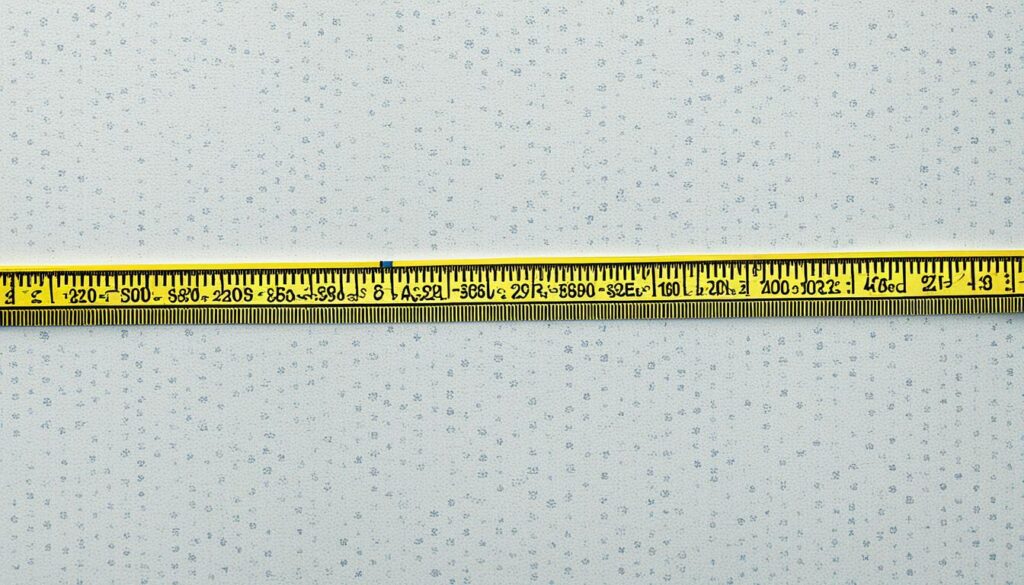
Using this conversion chart not only saves you time but also ensures accuracy in converting your height. Whether you need your height in centimeters for medical, fitness, or personal reasons, this handy chart is a valuable tool for accurate height conversion.
Benefits of Using cm for Height Measurements
When it comes to measuring height, using centimeters (cm) offers several benefits over inches. First and foremost, centimeters provide a more precise measurement, allowing for greater accuracy in height comparisons. Whether you’re comparing your height to others or tracking changes in your own height over time, centimeters offer a finer level of detail, helping you make more accurate assessments.
Furthermore, centimeters are the standard unit of measurement in many fields, including healthcare and fitness. Healthcare professionals rely on accurate height measurements for diagnoses, treatment plans, and monitoring patient growth. By using centimeters, they can communicate height information accurately and consistently across different medical settings.
In the fitness industry, centimeters are also widely used for body measurements and tracking progress. Whether you’re tracking your clients’ fitness journey or monitoring your own achievements, using centimeters ensures standardized and comparable results. This is particularly important when assessing body composition and setting personalized goals.

Another advantage of using centimeters is the ease of tracking height data. With centimeters being the standard unit, it becomes simpler to compare and analyze height statistics. Whether you’re examining growth patterns in children or studying population height distributions, centimeters provide a consistent measurement framework that facilitates data analysis and interpretation.
In summary, using centimeters for height measurements offers enhanced precision, aligns with standard practices in healthcare and fitness, and simplifies data analysis. Consider adopting centimeters as your preferred unit of measurement for height, and unlock the benefits of greater accuracy and improved comparability.
Practical Examples: Converting Inches to cm
Understanding how to convert inches to centimeters can be made easier by looking at some practical examples. Below are two examples that demonstrate the conversion process:
Example 1: Sarah’s Height
Sarah measures 65 inches in height. To convert her height to centimeters, we multiply 65 by 2.54, since 1 inch is equal to 2.54 centimeters.
Using the conversion formula, we find that:
65 inches * 2.54 cm/inch = 165.1 cm
Therefore, Sarah’s height is approximately 165.1 centimeters.
Example 2: Mark’s Height
Mark stands at a height of 72 inches. To convert his height to centimeters, we once again use the conversion formula: multiplying 72 by 2.54.
Calculating this, we get:
72 inches * 2.54 cm/inch = 182.88 cm
Hence, Mark’s height is approximately 182.88 centimeters.
These examples demonstrate how straightforward the conversion process is. By multiplying the number of inches by 2.54, you can accurately convert height measurements from inches to centimeters.
Summary
| Height (in inches) | Height (in centimeters) |
|---|---|
| 65 | 165.1 |
| 72 | 182.88 |
The table above provides a summary of the practical examples discussed, showcasing the conversions from inches to centimeters for Sarah and Mark’s heights.
Common Mistakes to Avoid
When converting inches to centimeters, it’s important to be aware of common mistakes that can lead to inaccurate conversions. By understanding these mistakes and how to avoid them, you can ensure precise and reliable height measurements. Here are some crucial mistakes to steer clear of:
- Forgetting to Multiply by 2.54: One common mistake is forgetting to multiply the number of inches by 2.54, which is the conversion factor for inches to centimeters. This step is essential for obtaining the accurate conversion. Always remember to multiply!
- Early Rounding: Another mistake to avoid is rounding the result too early in the conversion process. Rounding before all calculations are complete can introduce errors and inaccuracies. It’s best to perform all calculations first, and then round the final result based on your desired level of precision.
By avoiding these common mistakes, you can ensure accurate and reliable conversions from inches to centimeters. Remember to follow the conversion formula, double-check your calculations, and round the result appropriately. Now that you’re aware of these pitfalls, you’re well-equipped to perform precise height conversions!
Example:
Scenario: Sarah wants to convert her height of 65 inches to centimeters.
Mistake to Avoid: Sarah mistakenly forgets to multiply 65 by 2.54.
Correct Approach: Sarah should remember to multiply 65 by 2.54 to obtain the accurate conversion, which is 165.1 cm.
Now that you’re familiar with the common mistakes to avoid when converting inches to centimeters, let’s move on to some tips for achieving accurate height conversions.
Tips for Accurate Height Conversion
To ensure accurate height conversion from inches to centimeters, follow these tips:
- Use a reliable conversion formula and double-check your calculations. This will help you avoid any errors in the conversion process and ensure accurate results. Remember, accuracy is key when converting height measurements.
- Round the result to the nearest whole number for convenience, but keep the unrounded value for greater accuracy. Rounding the converted measurement can make it easier to work with, but it’s essential to retain the unrounded value for precise calculations or when needed in specific situations.
- Verify your converted height by using a conversion chart or comparing it to known measurements. Checking your converted height against a conversion chart or comparing it to other known measurements can provide validation and confidence in the accuracy of your conversion.
By following these tips, you can ensure that your height is accurately converted from inches to centimeters.

Importance of Height Conversion in Different Fields
Height conversion from inches to centimeters plays a crucial role in various fields. Whether it’s the medical field or the fitness industry, accurate height measurements are essential for different purposes, ensuring precise diagnoses, treatment plans, body measurements, and exercise techniques.
In the medical field, accurate height measurements are vital for several reasons. Physicians rely on accurate height data to assess patients’ growth, monitor changes in height over time, and provide appropriate treatment plans. Inaccurate height measurements can potentially lead to misdiagnoses and ineffective treatment. Therefore, converting height from inches to centimeters is a necessary step in ensuring accurate and standardized healthcare practices compatible with medical standards.
Similarly, the fitness industry heavily relies on height measurements to assess body composition, track progress, and tailor exercise programs according to individual needs. Fitness professionals use height as a key parameter in determining body mass index (BMI) and other measurements such as waist-to-height ratio. Converting height from inches to centimeters allows fitness experts to precisely analyze these metrics and provide appropriate guidance and training suggestions.
“Accurate height measurements are essential in both medical and fitness fields, influencing diagnoses, treatment plans, body composition assessments, and exercise techniques.”
Consequently, professionals in these fields need to understand the process of height conversion to ensure accuracy in their assessments and recommendations. A consistent standard of height measurement allows for reliable data interpretation and better communication across different healthcare providers, fitness trainers, and researchers.
| Field | Significance of Height Conversion |
|---|---|
| Medical | Accurate diagnoses and treatment, growth monitoring |
| Fitness | Precise body measurements, individualized training programs |
By highlighting the importance of height conversion in different fields, we can better understand the significance of accurate measurements and informed decision-making based on standardized height data.
Conclusion
Converting your height from inches to centimeters is a simple yet essential step in achieving accurate height measurements. By following the conversion formula of multiplying the number of inches by 2.54, you can easily convert your height to centimeters, allowing for greater precision.
It’s important to consider the context in which you will be using the converted measurement. Different fields, such as medical and fitness, may require specific height units. By converting your height to centimeters, you ensure compatibility with these industries’ standard unit of measurement.
Remember, accuracy is key when converting inches to centimeters. Double-check your calculations, round the result to the nearest whole number for convenience, but also keep the unrounded value for higher accuracy. By adopting these practices, you can confidently convert your height and ensure precise measurements in various settings.FAQ
Why is it important to convert your height from inches to cm?
What is the formula for converting inches to centimeters?
How can I convert my height from inches to centimeters?
Is there a conversion chart for common heights in inches and centimeters?
What are the benefits of using centimeters for height measurements?
Can you provide some practical examples of converting inches to centimeters?
What are some common mistakes to avoid when converting inches to centimeters?
What tips can you provide for accurate height conversion from inches to centimeters?
Why is height conversion from inches to centimeters important in different fields?
How Many Inches Are in a Pringles Can and How Does That Convert to cm?
The typical Pringles can height inches measurement is around 11.2 inches. To convert this to centimeters, simply multiply 11.2 by 2.54 to get 28.448 cm. So, a standard Pringles can is approximately 28.448 cm tall.
Source Links
- https://www.omnicalculator.com/conversion/height-converter
- https://www.thecalculatorsite.com/conversions/common/height-converter.php
- https://byjus.com/maths/inches-to-cm-converter/
Vira, Community Manager – Vira is the dynamic voice behind our community engagement. Vira ensures our readers are heard and engaged, whether addressing inquiries or sparking discussions. Her efforts create a welcoming space for learners and enthusiasts to share insights and deepen their understanding of symbolic languages.
Numerology and Astrology
The Meaning of CBM: How to Use It
Tackle the complexities of CBM to unlock cost-effective shipping solutions and enhance logistics efficiency.

Getting a handle on CBM (cubic meters) makes shipping goods by air, sea, or road smooth as silk. It’s **key for figuring out freight charges**, helping estimate costs and make the most of container space. CBM involves multiplying length, width, height, and item count, guiding logistics and converting volume to weight. Smart CBM strategies **boost shipment capacity**, balancing weight and volume. Understanding CBM’s role in transportation costs is **vital for planning logistics**. Check out how CBM can **simplify shipping** and make life easier.
Key Takeaways
- CBM determines cargo space in shipping.
- Calculate CBM with (Length x Width x Height).
- CBM influences freight charges.
- Optimize container space with accurate CBM.
- Efficient CBM use minimizes transportation costs.
Importance of CBM in Shipping
Understanding the significance of CBM in shipping is essential for accurately evaluating cargo space and transportation costs. CBM, or cubic meter, plays an important role in determining the volume of cargo being shipped, which directly impacts freight charges in air, sea, and road transportation.
By considering CBM in freight pricing calculations, businesses can estimate costs more effectively and plan their logistics with greater precision. The accurate calculation of CBM is critical for optimizing container space, ensuring efficient use of resources, and streamlining shipping operations.
It enables companies to make informed decisions regarding the allocation of goods, minimizing wasted space, and ultimately reducing overall transportation expenses. Therefore, a thorough understanding of CBM is necessary for cost estimation, maximizing efficiency, and enhancing competitiveness in the shipping industry.
Calculating CBM for Cargo

Moving on from discussing the importance of CBM in shipping, let's now shift our focus to the practical aspect of calculating CBM for cargo efficiently.
CBM, or cubic meter, is a significant metric in logistics planning, aiding in determining the space occupied by a shipment. To calculate CBM accurately, we use the formula (Length x Width x Height) x Quantity of items. This formula helps in evaluating the volume of the shipment, allowing for efficient loading and maximizing container space utilization.
Different shipment sizes necessitate individual CBM calculations, which are then summed up to estimate the total volume. Additionally, CBM plays a crucial role in converting volume to weight for various shipping methods like air, road, and sea. These conversion rates are based on specific CBM to weight ratios, ensuring that the cargo is effectively loaded based on its dimensional weight.
Understanding how to calculate CBM is essential for effective logistics management and maximizing shipping efficiency.
CBM Calculation Formula

How can we efficiently calculate the CBM for cargo shipments?
To determine the CBM, we use a straightforward formula: (Length x Width x Height) x Quantity of items.
If your shipment contains items of various sizes, apply the formula separately for each size, then sum up the volumes for an accurate total CBM.
It's important to confirm that all measurements are in meters to maintain precision in your calculations.
CBM plays a crucial role in estimating the volume of a shipment, aiding in logistical planning and cost estimation, especially for ocean freight where freight rates are often based on volume.
By accurately calculating the CBM, you can optimize container space, prevent underestimating shipping costs, and streamline your transportation processes.
Impact of CBM on Transportation Costs

CBM greatly influences transportation costs by dictating the space required for a shipment. Understanding the impact of CBM on transportation costs is imperative for efficient logistics planning and cost estimation.
Here are three key points highlighting the significance of CBM in transportation costs:
- Sea Shipping: CBM plays an essential role in sea shipping as it determines the volume of goods that can be accommodated in a container. This directly affects the freight rates charged for transporting goods via sea routes.
- Air Shipping: Conversion rates like 1 CBM = 167 Kg for air freight are essential in calculating charges for air shipping. The accurate assessment of CBM helps in estimating transportation costs for air shipments effectively.
- Road Shipping: CBM impacts road shipping costs by influencing the amount of space a shipment occupies in a truck or vehicle. Efficient utilization of CBM can lead to cost savings in road transportation.
Understanding how CBM affects transportation costs across different shipping methods is essential for optimizing freight rates and ensuring cost-effective logistics operations.
Efficient CBM Usage Strategies

To optimize shipment volume and enhance logistics efficiency, one must implement effective strategies for utilizing CBM accurately. Understanding the simple arithmetic formula of CBM (Length x Width x Height) is important for calculating the dimensional weight and evaluating the actual capacity within containers.
By considering weight and volume relationships, one can maximize shipment capacity by efficiently using the available space. Conversion rates play a significant role in determining the most cost-effective shipping methods and freight class categories determined by CBM.
Efficient cargo management strategies rely on optimizing container space through accurate CBM calculations. Hence, mastering the use of CBM is essential for minimizing costs and improving overall logistics operations.
Frequently Asked Questions
How Does CBM Work?
CBM works by calculating the volume of a shipment based on its width, height, and length. This calculation helps determine space occupancy on transportation modes like ships, aircraft, and trucks. It directly impacts transportation costs and logistical planning.
Different shipping methods use CBM to calculate charges, with conversion rates varying by mode: air (1 CBM = 167 Kg), road (1 CBM = 333 Kg), and sea (1 CBM = 1000 Kg).
What Is CBM Usage?
We calculate CBM by multiplying width, height, and length to determine shipment volume accurately. This calculation helps optimize space on ships, aircraft, and trucks, impacting transportation costs greatly.
CBM is essential for logistical planning and accurate cost estimation, guiding conversion rates for various shipping methods. Understanding CBM usage is important for efficient container space utilization and streamlined logistics planning.
How Do You Work Out Cbm?
To work out CBM, multiply the length, width, and height of your shipment. Remember to use meters for accuracy.
If you have different sized items, repeat the formula for each size and add up the volumes.
CBM calculation is essential for logistics and cost planning. It helps determine the shipment's total volume, enabling better organization and cost estimations.
What Does 1 CBM Look Like?
When looking at 1 CBM, envision a cube with each side measuring 1 meter. It symbolizes the volume taken up by a shipment, accommodating various items based on their sizes and shapes.
Understanding this unit aids in gauging storage and transportation requirements efficiently.
– Why is it important to understand shoe sizing terminology like ‘Gs’ when using CBM?
When using CBM, understanding shoe sizing terminology like “Gs” is essential for accurate measurements. The shoe sizing GS meaning refers to the sizing system specifically designed for kids’ shoes. By knowing this terminology, you can ensure that you are selecting the right size for the children’s shoes, leading to better customer satisfaction.
Conclusion
To sum up, grasping the significance of CBM and how to use it's vital in the shipping industry.
By calculating CBM accurately, you can optimize transportation costs and improve efficiency in cargo management.
So, don't underestimate the power of CBM – it can make a world of difference in your shipping operations.
Robert, Research Specialist—Robert specializes in visual explorations and brings a keen eye for detail to our research team. He delves into the historical and cultural backgrounds of symbols to present deeply researched content beautifully, making the old and mystical accessible to a modern audience.
Numerology and Astrology
Can Numerology Predict Lottery Numbers?
Solve the mystery of predicting lottery numbers with numerology, uncovering patterns and strategies that could change your luck.

Numerology can help identify patterns for choosing lottery numbers, increasing chances of success. Calculating Life Path and First Name Numbers, analyzing Birthdate Numbers, and utilizing current dates can offer insights into luck and destiny. Examining past winning numbers can reveal frequencies and hot/cold numbers for informed choices. While numerology provides a structured strategy, predicting exact winning numbers remains uncertain. Understanding numerology basics enhances lottery strategies. Angel numbers add a mystical aspect to the process, conveying messages that can enrich the overall experience. Exploring numerology further can uncover additional methods to enhance odds in selecting lottery numbers.
Key Takeaways
- Numerology aids in finding patterns for selecting winning lottery numbers.
- Life Path Number influences luck and destiny in lottery choices.
- Analyzing birthdate numbers provides insights for personalized winning combinations.
- Utilizing current dates in numerology helps predict lucky numbers.
- Examining past winning numbers reveals patterns for informed number selection.
Understanding Numerology Basics for Lotteries
When delving into the world of lotteries, understanding the basics of numerology becomes an essential step towards potential success. Numerology, the study of the mystical significance of numbers, plays a critical role in determining winning numbers for the lottery. By assigning numerical values to letters and analyzing these numbers, one can uncover patterns that may lead to selecting the right combination of numbers for a winning ticket.
In the domain of lotteries, your life path number is particularly significant. This number, derived from your birthdate, provides insights into your personality, strengths, and challenges. Understanding how your life path number interacts with the numerical values associated with the lottery can guide you towards selecting numbers that resonate with your energy and destiny. By incorporating numerology into your lottery strategy, you can enhance your chances of success and potentially reveal the secrets to winning big.
Calculating Life Path Number for Lotteries

When it comes to lotteries, understanding the significance of the Life Path Number is essential. This number, derived from our birth date, holds importance in numerology and can offer insights into luck and destiny.
Life Path Number Importance
Calculating the Life Path Number for lotteries is a crucial step in utilizing numerology to predict winning numbers. The Life Path Number, derived from your birth date number, offers insights into your personality traits and characteristics.
By understanding the significance of your Life Path Number, you can uncover your strengths and challenges, helping you make informed decisions when selecting lottery numbers. Numerology experts often emphasize the importance of the Life Path Number in enhancing the accuracy of predicting lottery numbers.
This essential element serves as a guiding factor in the process of leveraging numerology to increase your chances of winning. So, calculating your lucky number based on your Life Path Number can be a strategic approach in the pursuit of predicting lottery numbers using numerology.
Numerology and Luck
In numerology, determining your Life Path number for lotteries plays an essential role in revealing insights into your personal strengths and potential luck. Calculating this number involves reducing your birthdate to a single digit, offering a glimpse into the vibrational properties that may influence your lottery choices.
Aligning your lottery numbers with your Life Path number can enhance your chances of success, as numerology suggests. By incorporating your Life Path number into your lottery number selections, you can add a personalized and strategic approach to playing the lottery.
Understanding how your Life Path number relates to luck and winning can bring a unique perspective to your gameplay, potentially increasing your odds of a favorable outcome.
Winning Strategies With Numerology
Let's explore how harnessing the power of numerology through your Life Path Number can enhance your lottery strategies for increased chances of winning. Calculating your Life Path Number involves adding up your birth date digits to a single number, providing insights into your personality traits and potential lucky lottery numbers. By aligning your lottery picks with your Life Path Number, you can make more strategic choices, increasing your odds of success. Personalizing your plays with this numerological approach adds intention and meaning to your selection process. Consider the table below to determine your Life Path Number and uncover possible lottery numbers that resonate with your unique traits and energies.
| Life Path Number | Associated Traits and Potential Lottery Numbers |
|---|---|
| 1 | Leadership, innovation, 7, 17, 28 |
| 2 | Cooperation, harmony, 2, 11, 20 |
| 3 | Creativity, communication, 3, 12, 21 |
| 4 | Stability, organization, 4, 13, 22 |
Determining First Name Number for Lotteries

When determining the first name number for lotteries, assign numerical values to each letter in the first name based on their position in the alphabet. This method allows for a personalized approach to selecting lottery numbers using numerology. By calculating the first name number, individuals can tap into their unique vibrations to potentially enhance their luck in the lottery.
Here's a breakdown of the process:
- Assign numerical values to letters in the first name.
- Add the numerical values of each letter to get the first name number.
- Utilize the first name number for selecting lottery numbers.
- Benefit from personalized luck by incorporating numerology into your lottery number choices.
Analyzing Birthdate Numbers for Lotteries

Moving from determining the first name number for lotteries, now we shift our focus to analyzing birthdate numbers for lottery selection. Numerology offers lottery players a unique way to incorporate their birthdates into choosing lucky numbers. By converting birthdates into single-digit numbers, numerology provides insights into the vibrations associated with each individual's date of birth. These vibrations are believed to influence the outcomes of lottery plays, making the analysis of birthdate numbers essential for those seeking personalized and potentially winning number combinations.
Numerology enthusiasts emphasize the importance of understanding the significance of birthdate numbers when utilizing this practice for predicting lottery numbers. Each birthdate number carries its own distinct energy and symbolism, which can be harnessed by lottery players seeking an edge in their number selection process. By delving into the world of numerology and exploring the depths of birthdate analysis, lottery players can uncover hidden connections between their personal birth information and the numbers that may lead them to lottery success.
Utilizing Current Date for Lotteries
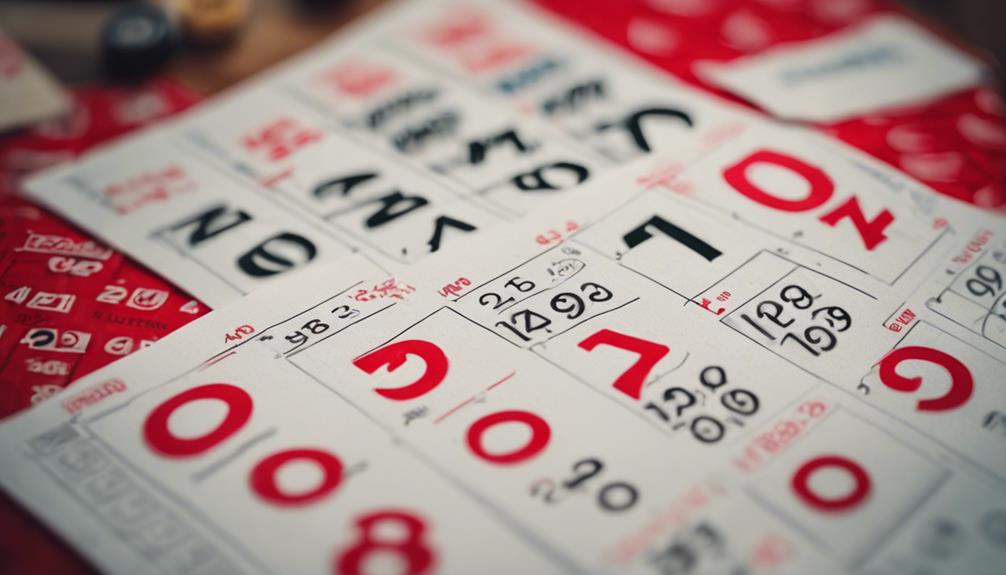
Utilizing the current date in numerology practices can greatly enhance one's approach to selecting lottery numbers. When considering the current date for lottery number selection, several innovative methods can be employed:
- Date Conversion: Converting the current date into numerology numbers offers a unique way to derive potential lucky numbers for lottery plays.
- Numerical Guidance: Specific numerical values corresponding to the current date can serve as a guide in choosing lottery numbers with enhanced precision.
- Pattern Recognition: Numerological analysis of the current date may reveal underlying patterns or significant numbers that could prove beneficial in predicting lottery outcomes.
- Enhanced Predictions: By incorporating the current date in numerology calculations, individuals can increase their chances of selecting winning lottery numbers through a more informed and strategic approach.
These methods showcase how leveraging the current date in numerology can lead to the identification of auspicious numbers for lottery plays, potentially enhancing one's success in these games of chance.
Examining Past Winning Numbers for Lotteries

When analyzing past winning numbers for lotteries, we focus on patterns, frequency of drawn numbers, and distinctions between hot and cold numbers. These elements provide valuable insights into potential lucky numbers and help us make informed choices when predicting future winning combinations.
Analyzing Number Patterns
In our analysis of past winning numbers for lotteries, we aim to uncover recurring number patterns that can guide our selection of potential winning combinations. When delving into the world of lottery number patterns, we focus on:
- Number patterns that frequently recur in draws
- Common combinations that have shown success in the past
- Frequency distributions of numbers over time
- The occurrence of specific numbers and their impact on potential wins
Frequency of Drawn Numbers
Analyzing past winning numbers for lotteries reveals the frequency of drawn numbers, aiding in strategic number selection based on historical data. By studying the frequency of drawn numbers, patterns and hot numbers can be identified, assisting in making informed choices for number selection.
Recognizing common combinations and recurring digits from previous draws provides valuable insights into potential lottery numbers. Observing the occurrence of specific numbers over time allows for the prediction of future draws. Utilizing frequency analysis of drawn numbers enhances strategies for choosing lottery numbers based on historical trends.
This analytical approach empowers players to make data-driven decisions when selecting numbers, increasing their chances of success in lottery games.
Hot and Cold Numbers
Exploring the patterns of hot and cold numbers from past lottery draws offers valuable insights for strategic number selection. When analyzing hot and cold numbers, consider the following:
- Hot numbers have been frequently drawn in previous lottery drawings.
- Cold numbers are those that have been drawn less frequently or not at all in past lottery drawings.
- Some players believe hot numbers are more likely to be drawn again, while others prefer cold numbers for potential overdue wins.
- Tracking hot and cold numbers can be a strategic approach used by lottery players to enhance their chances of winning.
Understanding the dynamics of hot and cold numbers can provide a unique perspective on choosing lottery numbers, potentially increasing your chances of a successful outcome.
Recognizing Angel Numbers in Lotteries

Spotting angel numbers in lottery results can add a mystical element to the thrill of playing. In numerology, angel numbers are repetitive sequences believed to convey messages from higher dimensions.
When these angel numbers, such as 111, 444, or 777, appear in lottery draws, they're often seen as symbols of luck or spiritual connection. Many individuals consider these angel numbers as their lucky numbers when participating in the lottery, attributing special significance to their presence.
Interpreting angel numbers in lotteries goes beyond mere chance; it can bring a sense of alignment and affirmation to players, enhancing their overall experience. The recognition of angel numbers in lottery outcomes can instill a positive outlook and a feeling of being guided by spiritual forces, heightening the excitement and sense of connection in the pursuit of winning.
Enhancing Odds With Numerology Readings

Utilizing numerology insights can greatly enhance one's chances of winning in lottery games by aligning numbers with personal vibrations and lucky influences. By delving into numerology for selecting lottery numbers, individuals can increase their odds of success significantly. Here are four ways numerology readings can boost your lottery playing experience:
- Identification of Lucky Numbers: Numerology readings can reveal numbers that hold personal significance, increasing the likelihood of them being lucky for you.
- Alignment with Vibrations: Understanding the vibrational frequencies associated with different numbers allows for a more harmonious selection that resonates with your personal energy.
- Personalized Advice: Numerology offers tailored guidance on lucky numbers, giving you an edge when choosing which numbers to play in the lottery.
- Optimized Selection: Through analyzing numerological patterns, you can optimize your choices, enhancing your chances of winning by selecting numbers that align with your unique vibrations.
Incorporating numerology into your lottery playing strategy can provide a new dimension of insight and potential success.
Frequently Asked Questions
Can Numerology Help You Win the Lottery?
Numerology can potentially assist in selecting lottery numbers, enhancing our chances of winning. By calculating core numbers like Life Path and Destiny numbers, we can strategically choose combinations.
Common numerology numbers such as 11, 22, 8, 3, and 5 are often utilized for this purpose. When combined with combinatorial analysis, numerology can provide valuable insights.
Understanding the success-to-failure ratio is key when leveraging numerology for lottery predictions.
Is There a Way to Predict Winning Lottery Numbers?
There isn't a foolproof way to predict winning lottery numbers, but certain strategies can increase our chances.
Analyzing past winning numbers to identify patterns and trends is a common method. Additionally, using statistical tools like combinatorial analysis can help in creating number combinations with higher probability of success.
While no method guarantees a win, these approaches can enhance our odds of hitting the jackpot.
Is There a Mathematical Formula to Predict Lottery Numbers?
Yes, there are mathematical formulas that can aid in predicting lottery numbers. Probability theory and combinatorial mathematics are essential tools for analyzing patterns and improving chances of winning.
Understanding the law of large numbers helps us make informed decisions when selecting lottery numbers. By calculating possible choices using these strategies, we can enhance our probability of success in lottery games.
Combinatorial analysis further identifies best-suited patterns, increasing our opportunities for favorable outcomes.
Is There an Algorithm That Can Predict Lottery Numbers?
We must acknowledge that there's no proven algorithm capable of accurately predicting lottery numbers. Lotteries operate on randomness, making precise predictions impossible.
Any claims suggesting otherwise are likely based on statistical analysis and patterns rather than concrete guarantees. While some algorithms rely on probability theory and historical data, skepticism and caution are essential when approaching systems claiming to predict lottery numbers.
Conclusion
To sum up, while numerology can offer some insights and strategies for choosing lottery numbers, ultimately, winning is often a matter of chance.
It's important to approach lottery play with a realistic mindset and understand that numerology is just one tool among many.
So, next time you play the lottery, consider incorporating some numerology tips for fun, but remember that luck can be a fickle friend.
Good luck!
Vira, Community Manager – Vira is the dynamic voice behind our community engagement. Vira ensures our readers are heard and engaged, whether addressing inquiries or sparking discussions. Her efforts create a welcoming space for learners and enthusiasts to share insights and deepen their understanding of symbolic languages.
-

 Cultural and Historical Symbols2 weeks ago
Cultural and Historical Symbols2 weeks agoUnderstanding “What Does Eid Mubarak Mean”
-

 Modern Symbols and Signs6 days ago
Modern Symbols and Signs6 days agoSubaru's Dashboard Symbols Unraveled: 10 Meanings
-
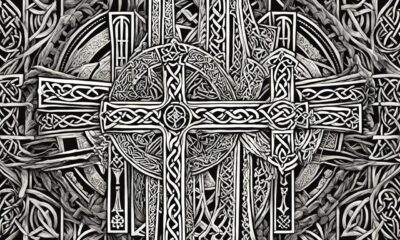
 Cultural and Historical Symbols2 weeks ago
Cultural and Historical Symbols2 weeks agoExploring Crosses and Their Meanings in Depth
-

 Modern Symbols and Signs2 weeks ago
Modern Symbols and Signs2 weeks agoIs Five Guys Closing Permanently? The True Story
-

 Cultural and Historical Symbols3 months ago
Cultural and Historical Symbols3 months agoKing Abdulaziz University Blackboard Guide
-

 Modern Symbols and Signs3 months ago
Modern Symbols and Signs3 months agoUnderstanding the Meaning of a Question Mark Road Sign
-

 Spiritual and Esoteric Meanings2 weeks ago
Spiritual and Esoteric Meanings2 weeks agoUnveiling Bird Poop on Car Spiritual Meaning
-

 Spiritual and Esoteric Meanings3 months ago
Spiritual and Esoteric Meanings3 months agoUnveiling the Meaning of 111 in the Bible
